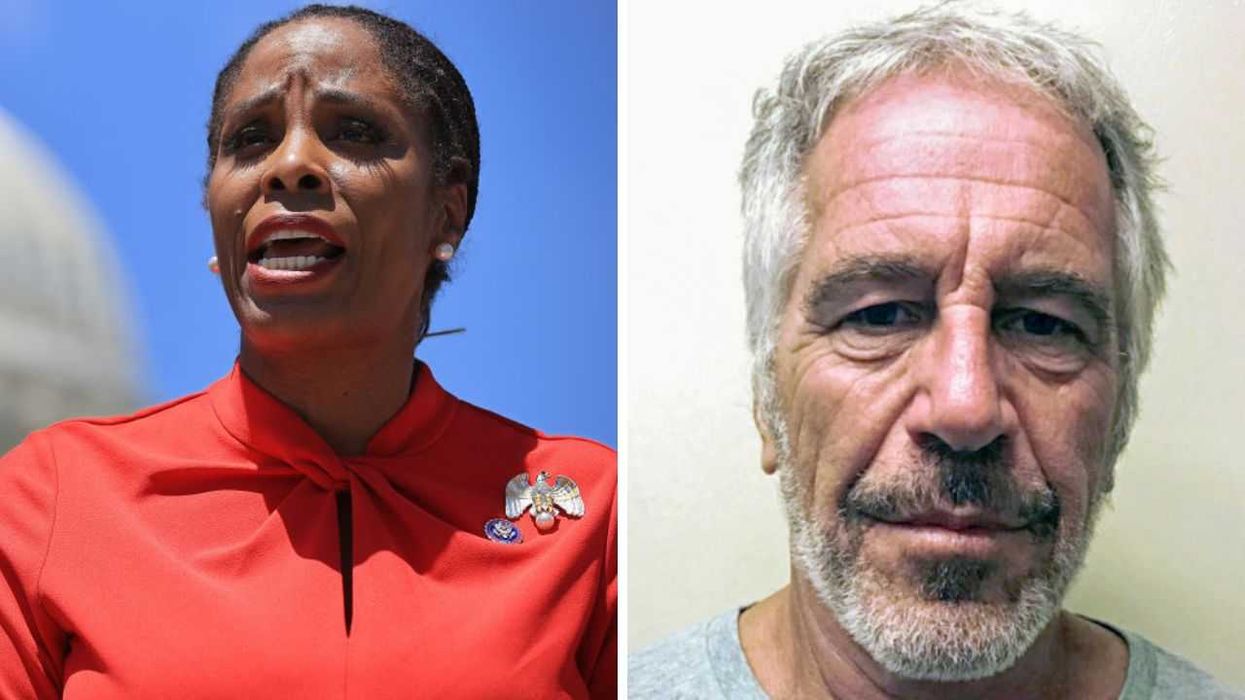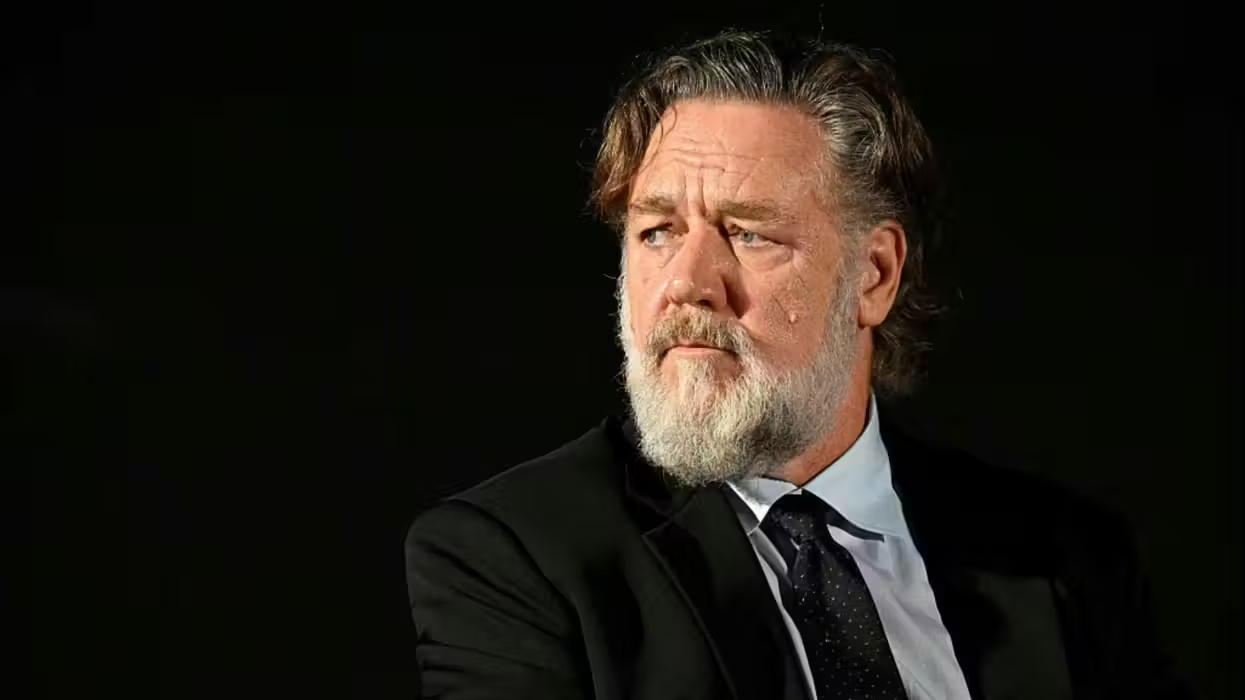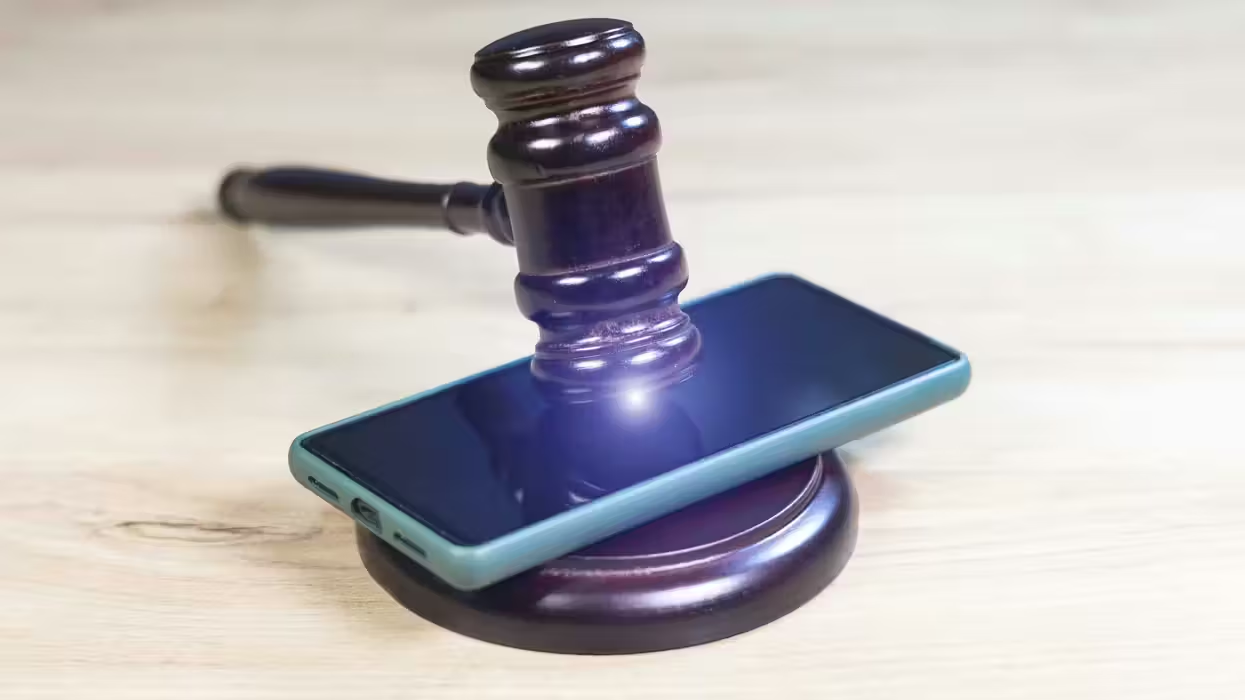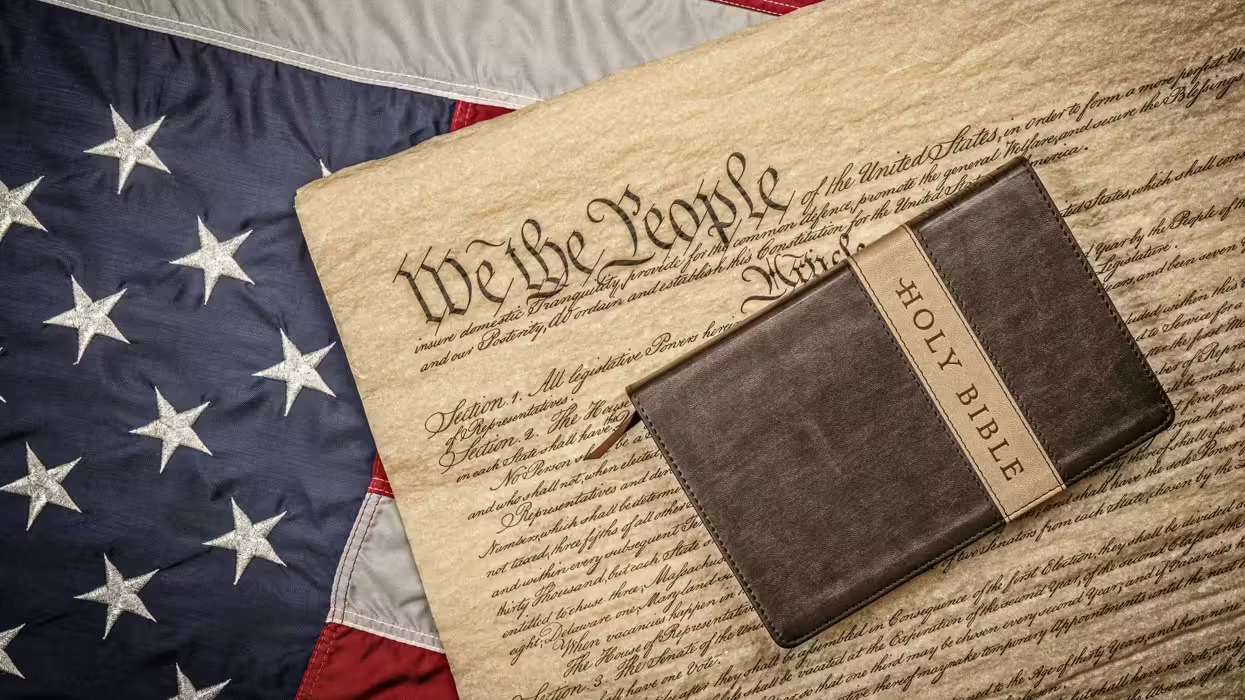“You gotta remember, establishment, it’s just a name for evil. The monster doesn’t care whether it kills all the students or whether there’s a revolution. It’s not thinking logically, it's out of control.”—John Lennon (1969)
It’s been 50 years since the Beatles—John Lennon, Paul McCartney, George Harrison and Ringo Starr—first landed in America on Feb. 7, 1964, and the news media is awash with nostalgic tributes to the band that “changed everything.”
The Grammys will be saluting the Beatles with a two-hour star-studded tribute. John F. Kennedy Airport plans to dedicate a historical marker to commemorate the moment the four lads from Liverpool arrived on a Pan Am flight, to be greeted by hordes of screaming fans.
And all across the country, including in New York City, conferences, tribute band performances, and reenactments will pay homage to Beatlemania and their music.
 In this Feb. 9, 1964 file photo, Ed Sullivan, center, stands with The Beatles, from left, Ringo Starr, George Harrison, John Lennon, and Paul McCartney, during a rehearsal for the British group's first American appearance, on the "Ed Sullivan Show," in New York. CBS is planning a two-hour special on Feb. 9, 2014, to mark the 50th anniversary of the Beatles’ groundbreaking first appearance on “The Ed Sullivan Show.” (AP Photo, File)
In this Feb. 9, 1964 file photo, Ed Sullivan, center, stands with The Beatles, from left, Ringo Starr, George Harrison, John Lennon, and Paul McCartney, during a rehearsal for the British group's first American appearance, on the "Ed Sullivan Show," in New York. CBS is planning a two-hour special on Feb. 9, 2014, to mark the 50th anniversary of the Beatles’ groundbreaking first appearance on “The Ed Sullivan Show.” (AP Photo, File)
While there is much to celebrate about the Beatles coming to America, there is also much to regret, starting with the fact that while we may remember the music of the Beatles, we’ve lost sight of the hope for change and revolutionary spirit that were hallmarks of those days.
Indeed, the Beatles opened the floodgates of music with their riveting Feb. 9 performance on the "Ed Sullivan Show" which was televised to 72 million Americans in what has been dubbed “the night that changed America.” Beatlemania, in turn, helped fuel a social, cultural and political revolution that took aim at everything from war, capitalism and racism to women’s rights, militarization and equality.
Fifty years later, while we may be inundated with a glut of music that passes for art and artists that pass for activists, with no shortage of national problems plaguing us (police abuse, endless wars, government corruption, government surveillance, inequality, etc.), we are sorely lacking individuals with the kind of radicalism and willingness to challenge the status quo.
[sharequote align="center"]We are sorely lacking individuals with the willingness to challenge the status quo.[/sharequote]
This is the difference between Then and Now, between an America that was ripe for the Beatles’ music and their message of change and an America that is celebrating the Beatles’ music while oblivious to their radicalism.
“The Beatles were like aliens dropped into the United States of 1964,” reports Todd Leopold for "CNN." Leopold continues:
Kennedy’s assassination 10 weeks earlier had left a gloom on the land. Together, the two events created a dividing line between Then and Now. “A lot of people don't understand why (Sullivan) was a seminal moment in the history of America and, for that matter, the history of the world,” former Arkansas governor and presidential candidate Mike Huckabee recalled in a recent speech. “The country had just gone through a very painful time of mourning. ... There was an extraordinary amount of despair, heartbreak, disappointment,” he continued. “I think people forget that we were still grieving as a nation. The Beatles brought something to America more than music. They brought hope.”
The Beatles converged with their era—the Sixties generation—in an almost unprecedented way. At no other time in history, or since, has a generation been so connected. The vehicle was rock music. And the Beatles helped create an aural culture. As Randy Lewis notes for the "Los Angeles Times":
If they were relatively friendly revolutionaries, with their pressed suits and bemused grins and professional politesse and their malt-shop lyrics, they were revolutionaries nonetheless… Now that everything is at our fingertips, a swipe or click away at any moment anywhere, it is hard to conceive of the effect they once had. The revolution had actually been televised then… Self-contained and self-directed — notwithstanding the guidance of manager Brian Epstein and producer George Martin, who were collaborators and not directors — the Beatles were something new and in no hurry to leave or conform. Other new things followed through doors they helped open. For better or worse, for a while, the world grew young.
The burgeoning baby boomers’ fascination with music brought the sixties generation into a collective whole. “Perhaps the most important aspect of the Beatles' attraction during that influential era,” writes author Steven Stark, “was their collective synergy.” In other words, the Beatles popularized the sanctity of "the group," amazingly so in a time when the traditional family was beginning to disintegrate. With the Beatles, the whole was always greater than the sum of the parts. This gave them a dazzling appeal.
 A crowd of demonstrators gather at the Washington Monument for a rally to protest the Vietnam War on Nov. 15, 1969. (Photo Credit: AP)
A crowd of demonstrators gather at the Washington Monument for a rally to protest the Vietnam War on Nov. 15, 1969. (Photo Credit: AP)
Unlike artists before them, the Beatles had power over millions of people worldwide. In 1967, for example, with the release of their "Sgt. Peppers Lonely Hearts Club Band" album, as one critic noted, it was the closest Europe had been to unification since the Congress of Vienna in 1815. Most thought North America could have been included as well. And the Beatles became the embodiment of the Summer of Love with their live global BBC television broadcast of "All You Need Is Love" in June 1967. Approximately 400 million people across five continents tuned in. This type of power was something new. Previously, only popes, kings and perhaps a few intellectuals could hope to wield such influence in their lifetime.
Some have even argued that the Beatles' influence helped bring down the Iron Curtain. As Yuri Pelyoshonok, a Soviet Studies professor, says:
The Soviet authorities thought of the Beatles as a secret Cold War weapon. The kids lost their interest in all Soviet unshakable dogmas and ideals, and stopped thinking of an English-speaking person as the enemy. That's when the Communists lost two generations of young people ideologically, totally lost. That was an incredible impact.
Following the assassinations of Martin Luther King Jr. and Bobby Kennedy in 1968, the optimism of the Summer of Love quickly evaporated and young people revolted worldwide. In the U.S., the cataclysm came as 10,000 demonstrators descended on the Democratic Party's national convention in August. Police reacted by brutally beating rock-throwing demonstrators as well as passersby, journalists and volunteers. Violence and revolt were now in vogue.
 John, right, and his Robert Kennedy. Photo Credit: Google
John, right, and his Robert Kennedy. Photo Credit: Google
The Beatles, the most influential pop voice of the time, responded to this shift towards violence with “Revolution,” the first Beatles song with an explicitly political statement. As "Revolution" stresses, it was not a movement about physically overthrowing a regime. It was a spiritual revolution, one aimed at overthrowing preconceived notions. Thus, before you can effect a lasting change, as John Lennon sings, you have to “free your mind.” As John Lennon sings in his masterpiece on the need for nonviolent change, “When you talk about destruction, don't you know that you can count me out?”
The underground press--which at the time included such newspapers as the "Village Voice"--immediately criticized the song and Lennon for not urging outright rebellion against authority. Lennon was quick to point out that if they really wanted a revolution, it had to begin with changing the way people think: "I'm not only up against the establishment but you too. I'll tell you what's wrong with the world: people--so do you want to destroy them? Until you/we change our heads--there's no choice."
It didn’t take long for Lennon, the activist of the group, to recognize that he could use his celebrity status to not only communicate his own ideas about the world but change the way people thought about issues of the day. He subsequently began his quest for worldwide peace. In fact, it may be that Lennon was the last great iconic anti-war activist of our age. Indeed, by October 1969, Lennon’s “Give Peace a Chance” had become a universal chant at anti-Vietnam War demonstrations. On November 15, during a peace rally in Washington, DC, the legendary folk singer Pete Seeger led nearly half a million demonstrators in singing “Give Peace a Chance” at the Washington Monument.
Unlike the other members of the Beatles, who are largely remembered for their music, Lennon’s political activism soon became a hallmark of the man himself. As "Time" magazine contributor Martin Lewis recognizes, “Of all Lennon’s legacies, one of the most enduring, and perhaps the most impressive, is who his enemies were. The true measure of his greatness was that in the 1970s he terrified the most powerful man in the world.” Lewis, of course, is referring to Richard Nixon, who became a determined enemy of Lennon.
Of all the Beatles, it may be Lennon’s activism which speaks most to the concerns of our present day and the ever-growing menace of the police state. In fact, as I document in my book "A Government of Wolves: The Emerging American Police State," Lennon, enemy number one in the eyes of the U.S. government, was targeted for surveillance by the FBI (most likely in conjunction with the NSA).
Fearing Lennon might incite antiwar protests, the Nixon administration directed the FBI to keep close tabs on the ex-Beatle, resulting in close to 400 pages of files on his activities during the early 1970s. But the government’s actions didn’t stop with mere surveillance. The agency went so far as to attempt to have Lennon deported on drug charges. As professor Jon Wiener, a historian who sued the federal government to have the files on Lennon made public, observed, “This is really the story of F.B.I. misconduct, of the President using the F.B.I. to get his enemies, to use federal agencies to suppress dissent and to silence critics.”
Fifty years after America first fell in love with Lennon and his mop-top comrades, the Beatles’ legacy lives on—at least, their musical legacy lives on.
Yet while the Beatles’ greatest legacy was in effecting a revolution of spirit and mind, today we’re in dire need of revolutionaries willing to challenge the status quo.
The world could use another revolution, don’t you think?
Constitutional attorney John W. Whitehead is founder and president of The Rutherford Institute and author of "A Government of Wolves: The Emerging American Police State." Whitehead can be contacted at johnw@rutherford.org.
–
TheBlaze contributor channel supports an open discourse on a range of views. The opinions expressed in this channel are solely those of each individual author.

 In this Feb. 9, 1964 file photo, Ed Sullivan, center, stands with The Beatles, from left, Ringo Starr, George Harrison, John Lennon, and Paul McCartney, during a rehearsal for the British group's first American appearance, on the "Ed Sullivan Show," in New York. CBS is planning a two-hour special on Feb. 9, 2014, to mark the 50th anniversary of the Beatles’ groundbreaking first appearance on “The Ed Sullivan Show.” (AP Photo, File)
In this Feb. 9, 1964 file photo, Ed Sullivan, center, stands with The Beatles, from left, Ringo Starr, George Harrison, John Lennon, and Paul McCartney, during a rehearsal for the British group's first American appearance, on the "Ed Sullivan Show," in New York. CBS is planning a two-hour special on Feb. 9, 2014, to mark the 50th anniversary of the Beatles’ groundbreaking first appearance on “The Ed Sullivan Show.” (AP Photo, File)





